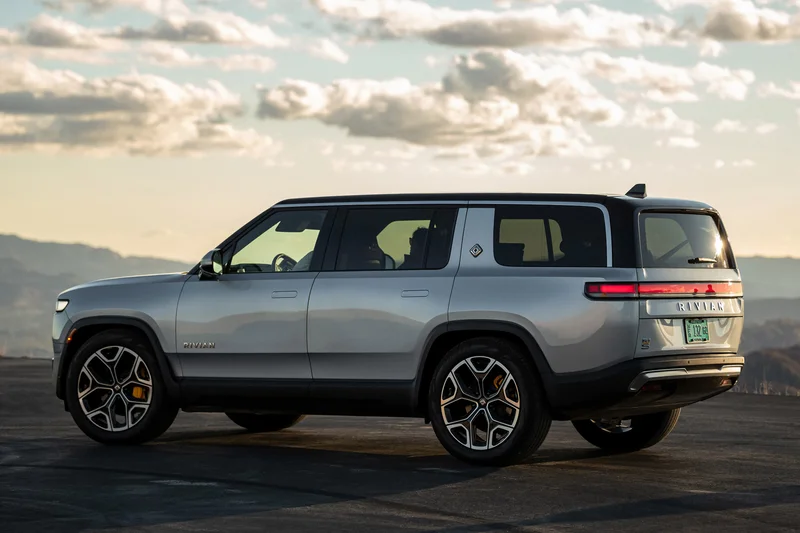So picture this: a sterile workshop somewhere in California. A brand-new, shiny Xiaomi SU7—the electric sedan that has China buzzing and Ford’s CEO singing its praises—is sitting under the harsh fluorescent lights. But it’s not there for a joyride. It’s surrounded by engineers with tools, ready to perform an autopsy.
This is the scene at Rivian, a company that was once worth more than Ford and is now fighting for its life. And I mean that literally. With a market cap that’s fallen off a cliff and quarterly losses that could choke a blue whale, they’re desperately looking for answers. They bought this $30,000 Chinese EV, tore it to pieces, and were hoping to find… what, exactly? Some kind of alien technology? A secret sauce? A magic bean that makes cars cheap and profitable?
They were looking for a miracle. And what they found was a spreadsheet.
According to Rivian CEO RJ Scaringe, the Xiaomi SU7 is "a really well executed, heavily vertically-integrated technology platform." He even said he’d consider buying one if he lived in China. That’s nice. It’s like the captain of the Titanic complimenting the iceberg’s structural integrity. Rivian CEO says the company tore down a highly popular Chinese EV. Here's what he thought.
But after all the meticulous disassembly, the big reveal was a spectacular dud. Scaringe admitted, "there's nothing we learned from the teardown." Nothing. Zero. Zip.
Let’s be real for a second. When a company is bleeding $1.77 billion in a single quarter—that’s not a typo—and its gross margins are so deep in the red they’ve hit the Earth’s core, you don’t tear down a competitor’s car for fun. You do it because you’re hoping to find a shortcut, a brilliant innovation you missed, something that explains how they can sell a solid EV for $30k while you can’t seem to make money on a $70k truck.
Instead, Scaringe came back with the most boring, predictable answer imaginable: China has low labor costs and massive government support.

It’s a smart move. No, 'smart' isn't the word—it's what you do when you're cornered. You change the conversation. You stop talking about your own failures and start talking about how the other guy is playing with a stacked deck. It’s a classic misdirection.
Here’s the line that really gets me. Scaringe says, "I think it's like Wizard of Oz... I think when people think there's a Wizard of Oz, it's not helpful. It's like there is no magic in the world."
Give me a break. He’s trying to sound like the wise, myth-busting CEO, pulling back the curtain to reveal the mundane truth. But what he’s actually doing is crafting an excuse. He’s saying, "Don't look at us! Look at the Chinese government! They get paid to build plants! Their cost of capital is zero!"
And offcourse he’s not wrong. Beijing does prop up its industries in ways that would make a US politician blush. But hold on a second. Scaringe complains about Chinese government support while his own company is in line for a $6.6 billion loan from the U.S. Department of Energy to build its Georgia plant. Is the real difference the type of government check you get, or just the number of zeroes on it? It seems a little hypocritical to cry foul about subsidies when you’ve got your own hand out.
The problem isn't that we think there’s a wizard. The problem is that American EV companies, especially the startups, built their entire business models on cheap capital, endless hype, and the assumption that people would pay any price for an electric vehicle with a cool logo. That world is gone. The Biden-era tax credits that propped up the market are history, and now we’re staring down a "super-brutal" price war. Rivian is exposed, naked, and its only explanation is, "the other guy's government is nicer to him."
It’s not magic, he says. It’s just math. Well, the math on Rivian’s balance sheet is terrifying. An annualized loss of over $7 billion would vaporize nearly all their available cash. They’re selling software and services to boost revenue because their actual car sales are a drag. This ain’t a growth story anymore; it’s a survival story. Is Rivian a Millionaire-Maker Stock? Maybe I'm the crazy one here, but it feels like blaming China is a hell of a lot easier than admitting your fundamental business model might be broken.
They keep pointing to the future—the cheaper R2 SUV coming in 2026. Two years is an eternity in this market. By then, who knows what the landscape will look like? Relying on a product that doesn't exist yet to save you from the problems you have today... that sounds a lot more like magical thinking than anything they found inside that Xiaomi.
So, after all that, the big mystery of the cheap Chinese EV is… basic economics. Rivian spent time and money tearing down a competitor’s car only to discover that when your labor is cheap and your factories are subsidized, your products are also cheap. This isn't a revelation; it's page one of a business textbook. The fact that this is presented as some profound insight tells you everything you need to know about how disconnected from reality these EV darlings were. They weren't looking for an engineering secret; they were looking for an excuse. And they found one. Too bad excuses don't pay the bills.